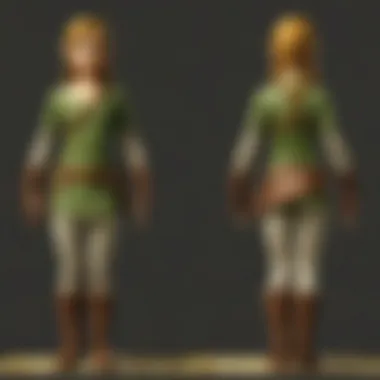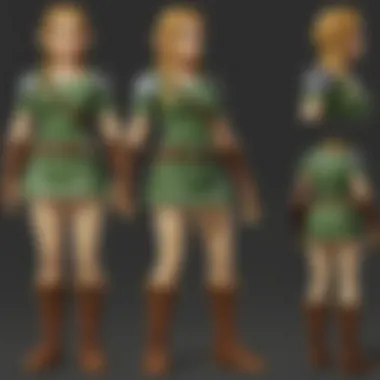Unraveling the Intricacies of Zelda Games' Evolution: An In-Depth Analysis


Game Reviews
When delving into the evolution of Zelda games, it is imperative to dissect the intricate layers of gameplay features and mechanics that have revolutionized the gaming landscape. From the innovative swordplay mechanics introduced in 'Ocarina of Time' to the open-world exploration in 'Breath of the Wild,' each installment in the series showcases a progression towards more immersive and dynamic gameplay experiences.
The storyline and quests woven throughout the Zelda universe are not merely narrative devices but pillars that uphold the entire gaming experience. Each quest undertaken by the protagonist, Link, serves a purpose beyond mere progression, often revealing deep-seated lore and hidden connections that enrich the overarching narrative.
Visual and sound design play a pivotal role in shaping the immersive world of Zelda. From the lush landscapes of Hyrule to the haunting melodies that echo through dungeons, every visual and auditory element contributes to the player's emotional engagement and investment in the game.
In comparing the latest titles with their predecessors, one can discern a clear evolution in gameplay mechanics, storytelling techniques, and graphical fidelity. The innovation and creativity exhibited in each new release not only pay homage to the series' roots but also push the boundaries of gaming excellence.
Character Analyses
A comprehensive analysis of Zelda games would be remiss without an exploration of the iconic characters that populate this fantastical universe. From the valiant hero, Link, to the enigmatic Princess Zelda and the calculating antagonist, Ganon, each character brings a unique dimension to the mythos of Hyrule.
Delving deeper into these characters reveals not just their external traits but also their inner complexities and motivations. The character development and backstories intricately woven into the gameplay provide players with a deeper understanding of their favorite heroes and villains.
The role of these characters within the Zelda universe extends beyond mere protagonists and antagonists; they are symbolic representations of courage, wisdom, and power, embodying essential themes that permeate the series.
Fan theories and speculations surrounding these characters further enrich the narrative tapestry, offering alternative interpretations and challenging players to perceive familiar faces in new and intriguing ways.
Lore Discussions
At the heart of the Zelda series lies a tapestry of mythology and world-building that elevates it beyond mere entertainment. The legendary items and artifacts scattered throughout Hyrule carry immense significance, steeped in history and imbued with mystical powers that drive the narrative forward.
Drawing inspiration from real-world mythologies, the Zelda universe weaves a narrative tapestry that resonates with cultural archetypes and ancient legends. The exploration of these connections adds a layer of depth and richness to the gaming experience.
The intricate timeline placement and theories surrounding the Zelda series have sparked intense debate and speculation among fans. Unraveling the complexities of this temporal tapestry requires keen attention to detail and an appreciation for the intricate storytelling woven throughout the multiple installments.
Gameplay Strategies
For players seeking to master the challenges presented in Zelda games, a comprehensive understanding of combat techniques, puzzle solutions, and boss battle tactics is essential. Each encounter within the game demands strategic thinking and clever use of resources to emerge victorious.


Navigating the myriad collectibles and side quests scattered across the vast expanse of Hyrule requires patience and perseverance. A detailed walkthrough and guide can aid players in uncovering hidden secrets and unlocking valuable rewards.
Boss battles represent the pinnacle of challenge in Zelda games, testing players' skills and reflexes to the utmost. Developing effective strategies and honing combat techniques are critical in overcoming these formidable foes and progressing through the game with confidence.
Introduction
In the realm of video game history, few franchises hold as much significance as the Zelda series. The Evolution of Zelda Games stands as a testament to the enduring legacy and impact of this iconic saga. From its humble beginnings to the latest releases, delving into the realm of Zelda is akin to exploring a vast universe filled with lore, innovation, and fan adoration. This comprehensive analysis aims to dissect the core elements that have shaped Zelda into a cultural phenomenon within the gaming industry.
Brief Overview of Zelda Games
Embark on a journey through time as we delve into the rich tapestry of Zelda games. Each installment in the series weaves a tale of adventure, heroism, and the battle between good and evil. From the classic top-down adventures to the sprawling open-world escapades, Zelda games have continually pushed the boundaries of storytelling and gameplay mechanics. As we dissect the evolution of Zelda, we will uncover the key milestones that have defined the series, from the original NES masterpiece to the critically acclaimed Breath of the Wild. Join us as we unravel the secrets of Hyrule and beyond, discovering why Zelda remains a cornerstone of the gaming universe.
The Origins of Zelda
The Origins of Zelda play a pivotal role in this in-depth analysis of the evolution of Zelda games. Understanding the origins of this iconic franchise provides crucial insights into the fundamental principles and concepts that have shaped the series over the years. By delving into the roots of Zelda, we can appreciate the creative vision and innovative spirit that gave birth to a beloved gaming phenomenon.
Creation of the First Zelda Game
The creation of the first Zelda game marks a significant milestone in the history of gaming. Developed by the legendary Shigeru Miyamoto, 'The Legend of Zelda' introduced players to a groundbreaking blend of exploration, puzzle-solving, and action-adventure gameplay. The open-world concept, non-linear progression, and emphasis on player agency set a new standard for interactive storytelling in video games.
Key Innovations in The Legend of Zelda
Key innovations in 'The Legend of Zelda' have had a profound impact on the gaming landscape. From introducing battery-backed save functionality to pioneering the use of parallel worlds and time travel mechanics, this inaugural title revolutionized conventional gaming norms. The incorporation of hidden secrets, iconic items like the Master Sword, and non-linear dungeon exploration redefined player expectations and established a template for future Zelda installments.
Gameplay Mechanics
In examining the evolution of Zelda games, understanding the intricate gameplay mechanics is crucial. The gameplay mechanics serve as the backbone of the Zelda series, defining how players interact with the game world and engage with its challenges. From the very first installment to the most recent releases, the consistent innovation in gameplay mechanics sets Zelda games apart from other franchises. Each game introduces new elements while retaining core functionalities, offering players a blend of familiarity and novelty. The meticulous design of puzzles, exploration, combat, and other gameplay components ensures that players are constantly challenged and entertained throughout their playthrough.
Exploration and Puzzle-Solving Elements
Exploration and puzzle-solving are integral aspects of Zelda games that contribute to their allure. The expansive game worlds are meticulously crafted to encourage exploration, with hidden secrets, dungeons, and challenges awaiting players at every turn. The incorporation of puzzles into the gameplay not only tests players' problem-solving skills but also adds depth to the narrative, often requiring strategic thinking and ingenuity to progress. The satisfaction of unraveling a complex puzzle or discovering a hidden path enhances the overall immersive experience of Zelda games, keeping players engaged and invested in the adventurous journey.


Combat System and Weaponry
The combat system and weaponry in Zelda games exemplify precision and strategy. From sword fights to ranged battles, players must master various combat techniques to overcome adversaries and bosses. Each game introduces a diverse array of weapons, each with unique attributes and strategic advantages. The skillful use of weapons and combat mechanics is essential for success in battles, as players must assess enemy patterns and weaknesses to emerge victorious. The evolution of combat systems over the years has not only enhanced the complexity of fights but also added layers of depth to the gameplay, ensuring that combat remains a challenging yet rewarding aspect of Zelda adventures.
Role of Music and Sound Design
Music and sound design play a significant role in enhancing the immersive experience of Zelda games. The iconic melodies and soundscapes accompanying players' journeys evoke emotions, set the tone for different environments, and punctuate pivotal moments in the narrative. The carefully composed music and sound effects complement gameplay, providing auditory cues for puzzles, battles, and exploration. The attention to detail in sound design, from ambient noise to character themes, enriches the atmospheric quality of Zelda games, making the gameplay more engaging and memorable. The harmonious integration of music and sound design elevates the overall aesthetic and emotional impact of the Zelda gaming experience.
Iconic Characters
In the realm of Zelda games, the Iconic Characters hold a pivotal role in shaping the narrative and immersive experience for players. These characters are the lifeblood of the series, each with their unique traits, motivations, and contributions to the gameplay. Understanding the significance of Iconic Characters is crucial as they add depth, emotion, and complexity to the game world. By delving into the backgrounds, relationships, and growth of these characters, players develop a more profound connection to the Zelda universe. Moreover, the presence of Iconic Characters enhances storytelling, drives player engagement, and fosters a sense of familiarity and nostalgia that loyal fans cherish.
Link: The Hero of Time
Link, the iconic protagonist of Zelda games, embodies courage, resilience, and heroism. From his humble beginnings as a young adventurer to his evolution as the legendary Hero of Time, Link's journey captivates players with its timeless appeal. His quest to save Hyrule, rescue Princess Zelda, and thwart the evil plans of Ganondorf showcases his unwavering determination and selflessness. Link's character development, silent yet expressive nature, and iconic green tunic have made him a beloved figure in the gaming world for decades.
Princess Zelda: The Wise Ruler
Princess Zelda, the epitome of wisdom and royalty in Zelda games, plays a pivotal role in maintaining balance and peace in the kingdom of Hyrule. As a powerful and sagacious leader, Zelda exudes grace, intelligence, and compassion. Her link to the Triforce, along with her ability to wield powerful magical abilities, places her in a position of great influence and responsibility. Throughout the series, Princess Zelda's character undergoes various incarnations, each showcasing her resilience, resourcefulness, and dedication to protecting her realm and its people.
Ganondorf: The Villainous King
Ganondorf, the malevolent antagonist of Zelda games, personifies darkness, ambition, and cunning. As the King of the Gerudo tribe and wielder of the Triforce of Power, Ganondorf poses a formidable threat to Hyrule and its inhabitants. His relentless pursuit of power, coupled with his tragic backstory and complex motives, make him a compelling adversary for Link and Zelda. Ganondorf's iconic presence, imposing stature, and nefarious schemes exemplify the essence of villainy in the Zelda universe, challenging players to confront and overcome the forces of evil.
Evolution of Graphics and Art Style
In the realm of Zelda games, the Evolution of Graphics and Art Style plays a pivotal role in shaping the visual identity of the series. From the rudimentary pixels of the early games to the immersive 3D environments of the latest installments, the progression in graphics and art style reflects the technological advancements and artistic aspirations of the creators. This section delves into the significance of enhancing graphics and art style, exploring how it engrosses players and adds layers of depth to the gaming experience. The meticulous attention to detail, vibrant colors, and intricate designs contribute to a more immersive and emotionally impactful journey for players.
Transition from 2D to 3D
The Transition from 2D to 3D marks a transformative phase in the Zelda series, ushering in a new era of gameplay possibilities and visual storytelling. As technology evolved, the shift from 2D to 3D graphics allowed for a more expansive and lifelike world for players to explore. Characters gained depth, environments became more dynamic, and puzzles took on a new level of complexity. This transition not only elevated the gameplay mechanics but also deepened the emotional connection and sense of immersion for players, setting a new standard for gaming innovation.


Artistic Influences and Visual Themes
Artistic Influences and Visual Themes in Zelda games demonstrate a fusion of cultural inspirations, mythological motifs, and artistic trends. The intricate visual styles draw from various sources, blending traditional Japanese aesthetics with fantasy elements to create a unique and captivating world. From the lush green fields of Hyrule to the mysterious dungeons and magical landscapes, each visual theme is meticulously crafted to evoke emotions and enhance the narrative experience. The interplay of light and shadow, monumental architecture, and character designs reflect a harmonious balance between artistry and storytelling, making Zelda games a visually stunning and intellectually stimulating journey for players.
Influence on Gaming Industry
As we delve into the remarkable world of Zelda games and their evolution, it becomes evident that the influence of this iconic series on the gaming industry is profound and far-reaching. The legacy of The Legend of Zelda franchise has transcended mere entertainment, shaping the very landscape of gaming for decades. One key element that stands out is how Zelda games have set a high standard for storytelling, gameplay mechanics, and world-building in the industry. The meticulous attention to detail in each installment has not only captivated players but has also inspired game developers worldwide to strive for excellence in their own creations. Moreover, the innovative approaches taken by Zelda games, such as implementing nonlinear gameplay and immersive narratives, have pushed boundaries and redefined what a successful game can achieve. Through critical and commercial success, The Legend of Zelda series has proven to be a pioneer in the field, influencing the direction of game development and setting benchmarks that continue to shape the industry to this day.
Legacy of The Legend of Zelda Series
The legacy of The Legend of Zelda series is one that stands as a testament to the enduring impact of this exceptional franchise. Since its inception, Zelda games have not only entertained millions of players but have also left a lasting impression on the gaming community as a whole. The thematic depth, rich lore, and memorable characters woven throughout each game have solidified Zelda's position as a cultural phenomenon. Beyond mere entertainment, the series has inspired a generation of gamers to embark on epic adventures, solve intricate puzzles, and believe in the power of courage and friendship. The legacy of The Legend of Zelda extends beyond the confines of gaming, influencing popular culture, music, art, and even academic discussions on storytelling and immersive worlds. As new generations of players discover the magic of Zelda games, the legacy continues to grow, ensuring that Link's adventures will remain timeless and cherished for years to come.
Inspiration for Other Game Developers
One of the most fascinating aspects of The Legend of Zelda series is its role as a wellspring of inspiration for other game developers. The innovative game design, compelling narratives, and memorable gameplay mechanics found in Zelda games have served as a source of creative fuel for countless developers seeking to craft their own masterpieces. The intricate balance between exploration, combat, and puzzle-solving present in Zelda titles has become a benchmark for excellence in game design, prompting developers to experiment with new ideas and push the boundaries of interactive storytelling. The influence of Zelda games can be seen in various genres, from action-adventure games to open-world epics, with elements such as dungeon crawling, hidden secrets, and compelling boss battles becoming staples in modern game development. By inspiring a new wave of creativity and pushing the medium forward, The Legend of Zelda series continues to shape the landscape of gaming, proving that its impact is not just limited to players who wield the Master Sword, but also to those who wield the pen and code to create their own digital worlds.
Community and Fandom
Community and Fandom play a pivotal role in the realm of Zelda games. The fervent support and engagement of the fan community contribute significantly to the longevity and popularity of the franchise. Zelda enthusiasts worldwide form a dynamic community that shares a deep passion for the games' rich lore, characters, and gameplay. This tight-knit community organically fosters discussions, fan theories, and artistic creations, creating a vibrant ecosystem around the beloved series. The exchange of ideas and perspectives within the community fuels creativity and enhances the overall Zelda experience for fans.
Dedicated Fan Base
The dedicated fan base of Zelda games is a cornerstone of the franchise's success. These ardent supporters not only play the games but also delve into the intricate details of the vast Zelda universe. They analyze every aspect of the games, from gameplay mechanics to narrative arcs, contributing to a robust community discourse. The loyalty and enthusiasm of the dedicated fan base serve as a testament to the enduring appeal and cultural significance of Zelda games, transcending generational boundaries and fostering a sense of camaraderie among fans worldwide.
Cosplay and Fan Theories
Cosplay and fan theories abound within the Zelda community, showcasing the creativity and dedication of fans. Enthusiasts often channel their passion for the series by embodying their favorite characters through intricate costumes and elaborate props. This practice not only pays homage to the beloved characters but also serves as a form of artistic expression and celebration of the Zelda legacy. Additionally, fan theories spark engaging discussions and speculations within the community, exploring hidden nuances and potential plot twists, further enriching the fan experience and deepening the connection to the games.
Impact of Online Forums and Fan Art
Online forums and fan art platforms play a crucial role in nurturing the Zelda community and fostering creativity. These digital spaces provide fans with the opportunity to connect, share their love for the games, and collaborate on projects. From fan-created art pieces to in-depth analyses of game mechanics, online platforms serve as hubs for creativity and expression within the Zelda fandom. The impact of online forums and fan art extends beyond mere entertainment, driving engagement, fostering friendships, and cementing the legacy of Zelda games in the digital age.
Future of Zelda Games
The realm of the Future of Zelda Games is a crucial aspect to discuss within the context of this comprehensive analysis. Unraveling the mysteries and potential pathways of what is yet to come in the Zelda universe provides enthusiasts and analysts with a glimpse into the creative future of this beloved franchise. Delving into the potential avenues that the developers may explore offers a tantalizing view of what fans could expect in terms of gameplay mechanics, storytelling innovations, and technological advancements. By examining the trends in the gaming industry and the feedback from the dedicated Zelda community, we can anticipate a future where the boundaries between imagination and reality blur even further. Understanding the evolving landscape of gaming and the ever-increasing demands of players sets the stage for a discussion on how Zelda games may adapt and thrive in the coming years.
Anticipated Releases and Speculations
In this subsection focusing on Anticipated Releases and Speculations, the spotlight is on the upcoming entries in the Zelda series that have captured the attention and imagination of fans worldwide. With the history of innovative titles preceding them, the anticipation levels for future releases are at an all-time high. Speculations run rife within the community regarding possible storylines, new gameplay mechanics, and stylistic choices that the developers may pursue. From rumors about revisiting classic timelines to the introduction of groundbreaking features, the excitement surrounding the next Zelda installment is palpable. Through careful analysis of developer interviews, teaser trailers, and fan theories, we aim to dissect the whispers of what lies ahead in the Zelda universe. By balancing logical predictions with creative conjectures, we seek to provide a comprehensive outlook on the potential directions the franchise may take, enticing readers to join us in the anticipation and speculation for the next chapter of Zelda games.







